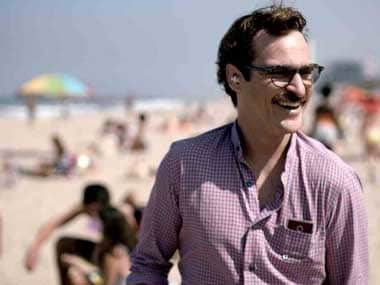You could think of Her, the latest Spike Jonze film, as a story about a man who falls in love with an operating system. You could describe it as a rom-com with a dystopian sci-fi twist, one that belongs in a box set with Michel Gondry’s Eternal Sunshine Of The Spotless Mind. But Jonze, who is best known for mind-benders like Being John Malkovich and Adaptation, has done more than imagine a love story in a futuristic setting. Her is an ode to urban loneliness and the emotional, existentialist crises brought on by the march of communications technology. [caption id=“attachment_1388893” align=“alignleft” width=“380”]  A still from Her.[/caption] Set in Los Angeles in the not-too-distant future, Her is about Theodore Twombly (Joaquin Phoenix, sporting a Tom Selleck moustache). Mild-mannered and emotionally distant, Theodore is on the brink of finalising his divorce from Catherine (Rooney Mara). He works at BeautifulHandwrittenLetters.com, where he composes personalised letters — he speaks and on a computer screen, his words are written in a handwriting that matches the client who has commissioned the letter. His interaction with other humans is limited to family and a few friends, including his old college friend Amy (Amy Adams) and his boss (Chris Pratt). Theodore’s world isn’t too difficult to imagine, filled as it is with people whose lives revolve around different voice-activated, virtual reality gadgets. It seems like a natural progression from where we are now. Public transport is filled with people peering into their phones and tablets. Fashion has evolved to give preference to function over form, with most people sporting high-waisted trousers that resemble yoga pants (as a way of hiding expanding waistlines, given America’s projected crisis of obesity?). In this recognisable but delicately-unfamiliar world created by Jonze, Twombly develops a relationship with his operating system Samantha (voiced by Scarlett Johansson). It’s a dazzling gem of a movie, one that had me either grinning goofily or struggling to blink away tears. Her revels in creating situations that seem absurd, yet completely plausible. This is a love story where the woman doesn’t even exist physically, yet, Jonze’s brilliantly written screenplay puts us in Twombly’s shoes, making us as an audience not just feel for him but with him as he makes his way through his bizarre, beautiful love story. The journey Samantha and Theodore take — and Samantha has her own journey, even if she is an operating system — goes through all the stages that modern relationships go through: attraction, flirtation, infatuation, sexual complications, jealousy and – as if all this wasn’t challenging enough to depict on screen between a voice and a man – polyamoury. Jonze is at his insightful, poetic best when writing the conversations between Theodore and Samantha, which lay bare so much about relationships and loneliness. From companionship to sex to dishonesty, Theodore and Samantha cover a vast emotional landscape with generous doses of irreverent humour as well as heartbreaking insight. If all this sounds like hyperbole, consider this film’s bravura moment: a sex scene in which the screen is blank and all we hear are the sounds of Theodore and Samantha’s voices. I promise you it is as erotic as any sex scene involving frontal nudity, if not more. After The Master, this is another cracker of a performance by Phoenix, an actor who seems as though he was born to play tormented, vulnerable characters (although this is by far one of the most likable characters he has ever played). Adams is astoundingly good as well, in a role that reveals itself to be more important than it initially appears to be. But the casting coup here is Johansson, brought in as a last-minute replacement for British actress Samantha Morton. With a husky voice that lilts beautifully between girlishness and commanding, she delivers what is probably one of the greatest voice-acting performances in cinematic history. During a heartfelt conversation with Samantha in the middle of the night, Theodore says, “I feel like I’ve already felt everything I will ever feel, and from here on, all I’ll feel will be lesser versions of things I’ve already felt.” This is followed by silence and a few cut-away images from Theodore’s life, soaked in sunshine, showing him with friends and family. In these 30-odd seconds of screen-time, Jonze nails down what nearly every working writer in the world is trying to capture: the crisis of a generation struggling to find meaning in their lives that will set them apart from the generations past. Her manages all that and more. It is the defining love story of our times, the kind whose script will be designated as required reading for film students everywhere. It is the new Annie Hall.
Her is an ode to urban loneliness and the emotional, existentialist crises brought on by the march of communications technology.
Advertisement
End of Article


)
)
)
)
)
)
)
)
)



